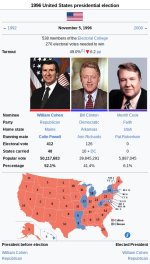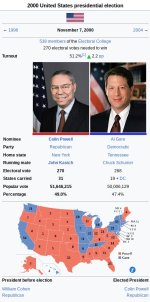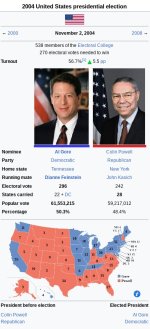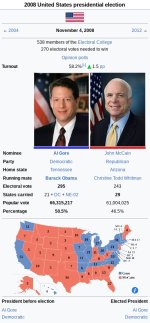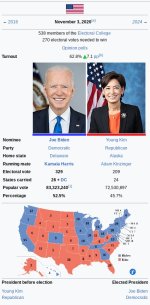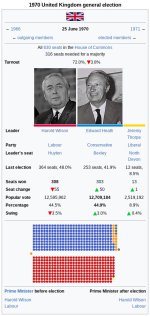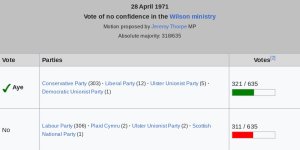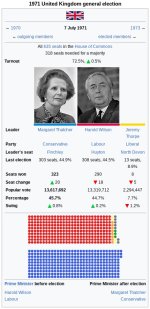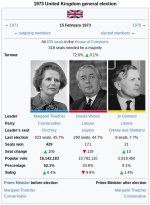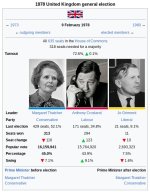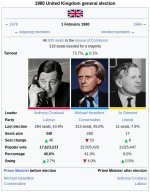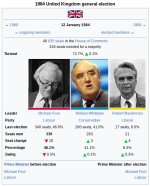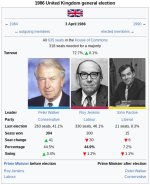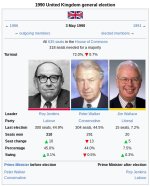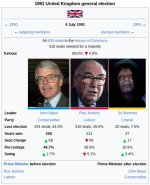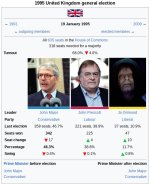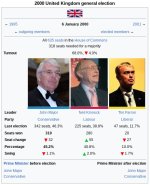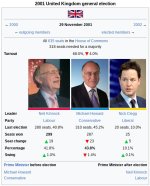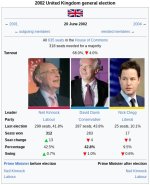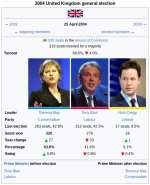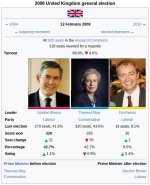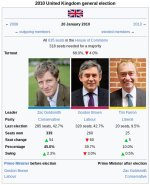Supreme Court (January 20, 1973):
CJ: Arthur Goldberg (1969, Humphrey)
AJ: William Douglas (1939, Roosevelt)
AJ: William Brennan (1956, Eisenhower)
AJ: Potter Stewart (1958, Eisenhower)
AJ: Byron White (1962, Kennedy)
AJ: Thurgood Marshall (1967, Johnson)
AJ: Shirley Hufstedler (1970, Humphrey)
AJ: Harry Blackmun (1972, Humphrey)
AJ: Frank Johnson (1972, Humphrey)
6 LIBERALS
3 MODERATES
Supreme Court (January 20, 1977):
CJ: Arthur Goldberg (1969, Humphrey)
AJ: William Brennan (1956, Eisenhower)
AJ: Potter Stewart (1958, Eisenhower)
AJ: Byron White (1962, Kennedy)
AJ: Thurgood Marshall (1967, Johnson)
AJ: Shirley Hufstedler (1970, Humphrey)
AJ: Harry Blackmun (1972, Humphrey)
AJ: Frank Johnson (1972, Humphrey)
AJ: John Paul Stevens (1975, Rockefeller)
5 LIBERALS
4 MODERATES
Supreme Court (January 20, 1981):
CJ: Arthur Goldberg (1969, Humphrey)
AJ: William Brennan (1956, Eisenhower)
AJ: Potter Stewart (1958, Eisenhower)
AJ: Byron White (1962, Kennedy)
AJ: Thurgood Marshall (1967, Johnson)
AJ: Shirley Hufstedler (1970, Humphrey)
AJ: Harry Blackmun (1972, Humphrey)
AJ: Frank Johnson (1972, Humphrey)
AJ: John Paul Stevens (1975, Rockefeller)
5 LIBERALS
4 MODERATES
Supreme Court (January 20, 1985):
CJ: Arthur Goldberg (1969, Humphrey)
AJ: William Brennan (1956, Eisenhower)
AJ: Byron White (1962, Kennedy)
AJ: Shirley Hufstedler (1970, Humphrey)
AJ: Harry Blackmun (1972, Humphrey)
AJ: Frank Johnson (1972, Humphrey)
AJ: John Paul Stevens (1975, Rockefeller)
AJ: Edward Levi (1981, Holtzman)
AJ: A. Leon Higgenbotham (1983, Holtzman)
6 LIBERALS
3 MODERATES
Supreme Court (January 20, 1989):
CJ: Arthur Goldberg (1969, Humphrey)
AJ: Byron White (1962, Kennedy)
AJ: Shirley Hufstedler (1970, Humphrey)
AJ: Harry Blackmun (1972, Humphrey)
AJ: Frank Johnson (1972, Humphrey)
AJ: John Paul Stevens (1975, Rockefeller)
AJ: Edward Levi (1981, Holtzman)
AJ: A. Leon Higgenbotham (1983, Holtzman)
AJ: Stephen Breyer (1988, Holtzman)
6 LIBERALS
3 MODERATES
Supreme Court (January 20, 1993):
CJ: Edward Levi (1990, Carter)
AJ: Byron White (1962, Kennedy)
AJ: Shirley Hufstedler (1970, Humphrey)
AJ: Frank Johnson (1972, Humphrey)
AJ: John Paul Stevens (1975, Rockefeller)
AJ: A. Leon Higgenbotham (1983, Holtzman)
AJ: Stephen Breyer (1988, Holtzman)
AJ: Ruth Bader Ginsburg (1989, Carter)
AJ: Richard Riley (1991, Carter)
7 LIBERALS
2 MODERATES
Supreme Court (January 20, 1997):
CJ: Edward Levi (1990, Carter)
AJ: Frank Johnson (1972, Humphrey)
AJ: John Paul Stevens (1975, Rockefeller)
AJ: A. Leon Higgenbotham (1983, Holtzman)
AJ: Stephen Breyer (1988, Holtzman)
AJ: Ruth Bader Ginsburg (1989, Carter)
AJ: Richard Riley (1991, Carter)
AJ: Jose Cabranes (1993, Cohen)
AJ: Sandra Day O'Connor (1996, Cohen)
6 LIBERALS
2 MODERATES
1 CONSERVATIVE
Supreme Court (January 20, 2001):
CJ: Edward Levi (1990, Carter)
AJ: John Paul Stevens (1975, Rockefeller)
AJ: A. Leon Higgenbotham (1983, Holtzman)
AJ: Stephen Breyer (1988, Holtzman)
AJ: Ruth Bader Ginsburg (1989, Carter)
AJ: Richard Riley (1991, Carter)
AJ: Jose Cabranes (1993, Cohen)
AJ: Sandra Day O'Connor (1996, Cohen)
AJ: Merrick Garland (1999, Cohen)
6 LIBERALS
2 MODERATES
1 CONSERVATIVE
Supreme Court (January 20, 2005):
CJ: Richard Riley (2004, Powell)
AJ: John Paul Stevens (1975, Rockefeller)
AJ: Stephen Breyer (1988, Holtzman)
AJ: Ruth Bader Ginsburg (1989, Carter)
AJ: Jose Cabranes (1993, Cohen)
AJ: Sandra Day O'Connor (1996, Cohen)
AJ: Merrick Garland (1999, Cohen)
AJ: John Yoo (2002, Powell)
AJ: Clarence Thomas (2004, Powell)
4 LIBERALS
3 CONSERVATIVES
2 MODERATES
Supreme Court (January 20, 2009):
CJ: Richard Riley (2004, Powell)
AJ: Stephen Breyer (1988, Holtzman)
AJ: Ruth Bader Ginsburg (1989, Carter)
AJ: Jose Cabranes (1993, Cohen)
AJ: Sandra Day O'Connor (1996, Cohen)
AJ: Merrick Garland (1999, Cohen)
AJ: John Yoo (2002, Powell)
AJ: Clarence Thomas (2004, Powell)
AJ: Sonia Sotomayor (2007, Gore)
5 LIBERALS
3 CONSERVATIVES
1 MODERATE
Supreme Court (January 20, 2013):
CJ: Merrick Garland (2011, Gore)
AJ: Stephen Breyer (1988, Holtzman)
AJ: Ruth Bader Ginsburg (1989, Carter)
AJ: Jose Cabranes (1993, Cohen)
AJ: Sandra Day O'Connor (1996, Cohen)
AJ: John Yoo (2002, Powell)
AJ: Clarence Thomas (2004, Powell)
AJ: Sonia Sotomayor (2007, Gore)
AJ: Elena Kagan (2012, Gore)
5 LIBERALS
3 CONSERVATIVES
1 MODERATE
Supreme Court (January 20, 2017):
CJ: Merrick Garland (2011, Gore)
AJ: Stephen Breyer (1988, Holtzman)
AJ: Ruth Bader Ginsburg (1989, Carter)
AJ: John Yoo (2002, Powell)
AJ: Clarence Thomas (2004, Powell)
AJ: Sonia Sotomayor (2007, Gore)
AJ: Elena Kagan (2012, Gore)
AJ: Lucy Koh (2014, Obama)
6 LIBERALS
2 CONSERVATIVES
Supreme Court (January 20, 2021):
CJ: Merrick Garland (2011, Gore)
AJ: Stephen Breyer (1988, Holtzman)
AJ: Ruth Bader Ginsburg (1989, Carter)
AJ: John Yoo (2002, Powell)
AJ: Clarence Thomas (2004, Powell)
AJ: Sonia Sotomayor (2007, Gore)
AJ: Elena Kagan (2012, Gore)
AJ: Lucy Koh (2014, Obama)
AJ: John Roberts (2017, Kim)
6 LIBERALS
3 CONSERVATIVES
Supreme Court (Present):
CJ: Merrick Garland (2011, Gore)
AJ: Stephen Breyer (1988, Holtzman)
AJ: John Yoo (2002, Powell)
AJ: Clarence Thomas (2004, Powell)
AJ: Sonia Sotomayor (2007, Gore)
AJ: Elena Kagan (2012, Gore)
AJ: Lucy Koh (2014, Obama)
AJ: John Roberts (2017, Kim)
AJ: Ketanji Brown-Jackson (2022, Biden)
6 LIBERALS
3 CONSERVATIVES
CHIEF JUSTICES OF THE SUPREME COURT:
Earl Warren: October 5, 1953-June 23, 1969
Arthur Goldberg: June 23, 1969-December 1, 1990
Edward Levi: December 1, 1990-March 15, 2004
VACANT: March 15, 2004-May 20, 2004
Barbara Jordan: May 20, 2004-August 2, 2004 (Recess Appointment)
Richard Riley: August 2, 2004-June 2, 2011
Merrick Garland: June 2, 2011-Present


